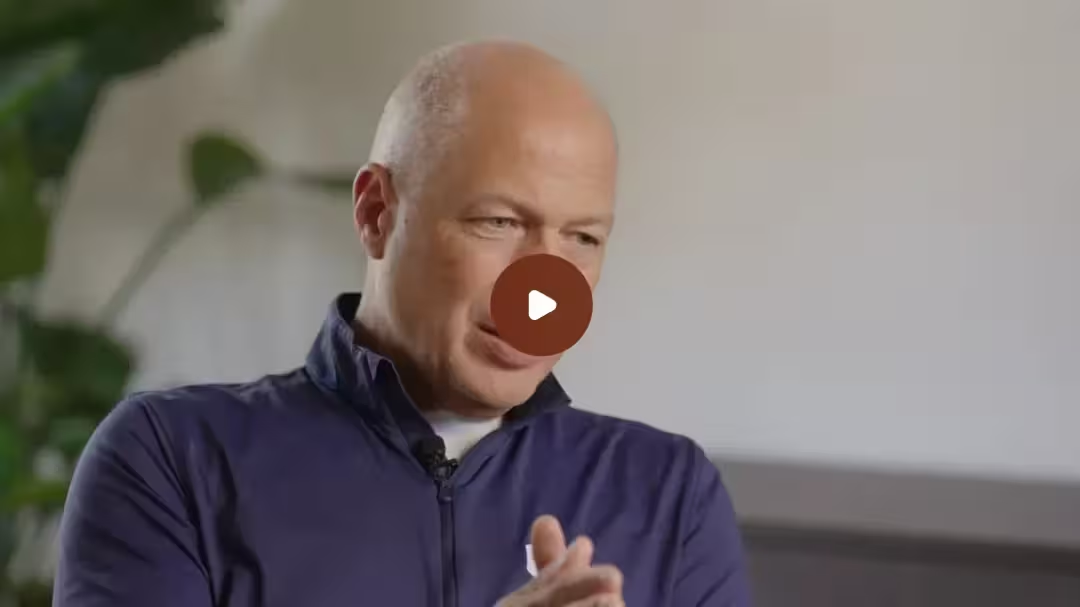The Interview
Kluster's Take
Theo spoke with Andrew Stankiewicz, VP of Sales North America at Sana Commerce. He explains his unique approach to leadership.
Andrew has spent 12 years working in sales, including working as a sales trainer. This is his 4th role as a VP of Sales. He believes that A-players find a way of getting things done, and think outside of the box to do so. They “pass the eyeball test every time”. Andrew thinks that some A-Players don’t need coaching or managing. They are self-driven individuals that will do anything to succeed.
He is a big advocate of the situational leadership formulae. Andrew believes that C players can transform into A players. They just need to realise their potential. He doesn’t believe that these brackets are definite, they can always change. Andrew believes that underperformance is fixable, leaders must treat their reps like people. This improves performance and helps them to be loyal.
Transcription
And a player. They always find a way to get it done regardless of what it is. And they're able to think outside the box to do so. It passes the eyeball test every time.
I've been in sales now for the better part of 12 years. Uh I'm in my fourth role as a VP of sales. So I've started as a ground floor seller prospecting partner selling the whole nine. Um, worked my way through the system at a major fortune 200 company was a sales trainer. So I went deeper into the science of sales and what's what makes top people talk.
Um, couple of years of frontline leadership. And like I said, since then various types of VPs of sales roles. Okay, awesome. And what was, uh, the fortune 200 company ABB AVP. Nice, fantastic. So you're going to be very well placed then to discuss this topic, I imagine. Um, so, so let's start off with what, what the fines in a player, um, maybe let's start off with personality traits and then we can move into metrics.
Yeah, absolutely. So I asked, uh, my first manager at one time, what makes him a player? And that rings true today. And it's not the best answer in a sense that it's not as specific as a metric, which I can get into, but ultimately, um, you know, end results are the obvious answer here. And just add that as the X factor.
So, uh, an a player, uh, they always find a way to get it done regardless of what it is, and they're able to think outside the box to do so. So that's really, in my opinion, as an A-plus. Um, it passes the eyeball test every time. Brilliant. So give me maybe some examples of people you've worked with who've who've had those, those characteristics and traits.
Sure. So I would say, um, you know, the, the main difference between an a and a B player two is, uh, You know, an, a player, they realize their full potential. Now. So people that have actually worked with, you know, they always find a way to hit their monthly target. And if they're not going to hit their monthly target, they look at the metrics that lead to those.
So it's very little leadership from the, the manager or the leader. Um, and they pretty much, they will go out and they'll break themselves to hit their goals because they want it for themselves more than anything. Uh, and that's, that's a great thing that. Awesome. Fantastic. Um, how do you turn the process of maybe tuning in like a B player into an A-player or C player into a B player, something that's tangible and coachable and yours in your time?
How, what from your experiences, how have you done this? Yeah, well, it's definitely regular coaching on no matter how good the results are. So the specific tangible thing that I would use is the situational leader. Um, so if you just Google situational leadership, there's a very basic, it's like a four squared analysis or D one D two D three D four, a it's basically how good they are in a certain situation.
So what a lot of people do is, um, they forget that top people want to be challenged. They want to be improved. And the mistake that a lot of leaders make is. Um, there's any players that have very basic skills that are not the best. So you'd have to look at how good somebody is, um, in the moment. So I mentioned end results, and A-players gonna hit their targets most months, or blow up their number during the busy season.
Um, and then you go and say, well, let me see your demo. And you realize their demo is not as good as someone that's been there. Three. So the tangible thing that a leader can do is really focused on what are they good at and what are they not good at? And the top person is typically the most coachable as well.
So they're more than happy to take that feedback. Okay. Awesome. And we discussed previously about, you know, how is it possible? Is, is an, a player, just a mentality that people are born with or nurtured before they even arrive at a company. And then they just have that mentality of, I want to dominate. I wants to be the best and they get there.
Have you had instances? And if so, like maybe some examples of that, where, where people have joined you with. A C player, like not great. I'm not hitting the target and they've somehow turned it and I've already become a B player, but also a player. Absolutely. Yeah. Um, you know, it really comes down to maximize people's potential.
And that's what I was saying. You know, the difference between an, a player and B players that the A-players realizing their potential. Now there's plenty of people that have. You know, their eyes are bigger than their stomach is what I would say and that, oh, I'm going to be the best salesperson. I'm going to do this.
I'm going to do that. But they don't even know where to begin. So you can have a, B or a C player, join your team, join your organization, whether it's business or sports or some other competitive environment. And they need someone to bring it out of them, whether it's a leader, whether it's a culture of competitiveness, but also supportive that they didn't have at their previous.
Right. So I've seen it where, you know, I'll give you an example. There was one person in particular that was at a company and he didn't have a frontline leader. So he was basically, they were like, Hey, go develop this market. I don't. And so I came in as a VP and I was the frontline leader for a few months, but the big difference was I was able to bring in a frontline leader immediately that brought out the best in this person.
So, um, this individual went from being a C player, probably at the variable. Um, top bottom 5% of the organization was on written warning to be pushed out of the organization because of almost two years of extreme underperformance. But when they had someone come in that believed in them and gave them structure and gave them coaching, um, then they went on the following year to be an, a president of the club performer out of the entire organization.
He went from the bottom 5%, the top 5%, and that was simply getting someone that believed in them. You know, did the situation or leadership and one day at a time you get better at your gaps. That's so interesting. So th that's, uh, I'd like to go into slightly more depth there. So, you know, th this, this topic you can easily just discuss.
You know, Hey, plays have mentality and it's solely down to the, to the individual, but leadership is super, super important. Right? How important is, you know, example of you had maybe wasted potential where you've seen, seen some reps who have been, you know, had great potential, but just necessarily in another team who haven't had that, that, that leadership, uh, or the leadership style that, that they required to perform.
So how do you identify someone that's not realizing their potential? Yeah. Uh, maybe on the point of leadership is so important and, you know, have you seen examples where the leadership just hasn't been there for further for other reps and they've, they've suffered from, uh, from, from that, oh, all the time.
I mean, I've been guilty of that myself. Um, you know, and when I talk about success stories, it's not necessarily something I did. Right. Um, it's about setting them up for success. And if you're a VP and you have frontline leader, It really is a job with the frontline leader to get the most out of their A-players.
So, um, you know, plenty of times performance is, uh, is fixable. You just have to know exactly what you're looking for, um, for that role to be successful. So someone could be at a company and in a very similar sales role, but there's the major difference at the new company where they realize their full potential.
And a lot of times it's just a better leader. And I think right now you see a lot of people leaving jobs. Cause you know, companies are growing this time of year, especially in the fall, um, companies have money to spend and budget to use up. So you've got these big offers and whenever someone is trying to leave an organization, it's good that you have a transparent relationship with your team or they can come to you and say, Hey, I got an offer.
Um, but a key thing that I'll always challenge them on as well. I'm not, you know, if you're going to leave her a much better opportunity, we can't match it. That's okay. Have you looked at the leader that you're going to be working for directly because that's usually when someone either takes the offer or fails.
Interesting. So like with, with, with leadership, I guess there's multiple ways you can do this, but what are some of the fundamental ways of, of being a leader who motivates his or her rats? Yeah, I think that's a great question. And I think that as. Um, people want to be treated like people, right? They, they, they have families, they have lives, they have good days and bad days, uh, aside from work.
And, you know, as a new leader, especially as a new frontline leader, I was very tone deaf to that. So I learned the hard way a lot of times. So I'll be the first to a minute. Um, but it's amazing how far it goes when you're like, Hey, you know what, why don't you take the day off? You don't have to, um, you know, put in PTO and just, you know, go be with your wife today or go be with your husband today.
Yeah, it happens all the time. So they like to see those little things that show that you care about them as a person. Um, and that also could be a catalyst for someone being like, okay, I'm uncomfortable here. I realize my full potential at this company. Yeah. I think, you know, it's, it's so important for reps, especially to feel like, like they're valued and it can be quite easy to, we would discuss them before, like seeing reps as a, as.
As a way of making money and like work, work, work, where actually it goes a long way to give them a break and show them that they are humans and they do have families. Right? Yeah. And it goes that further. So you have that aspect, but I can think very specifically of teams, especially as a frontline leader, I had two top performers that were 65% of my team's performance.
And the two of them were, they had the similarities cause they were tenacious, persevering and all those great qualities of eight players. But. Very different ways of motivating. One of them was a football player and he just loved. He's like, honestly, getting my face and tell me that I'm terrible. Right.
And one of the hard truth. And then my other top performer, she was completely different. She just wanted you to tell her that she was great because she was, she was phenomenal. She worked hard. They both worked hard. They were both great talent, but the way that they wanted to be motivated was differently.
So if you can bond and connect with, uh, you know, all of your. It's much easier to identify who the players are and then how to motivate. That's a great point that I love. I love that story also because you know, like saying, uh, any play mentality may think that it's just like work, work, work, and they need to be, they, they have a certain way of working, but the reality is very different.
When did you realize that having different approaches to different reps yielded different rewards in grades? When I had a hundred turnover, my first time being a frontline leader, I made the mistake of thinking that there's only one way to be successful and that's the way that I was successful. Right.
So, um, you know, at the time I was doing a bunch of cold calling and I was challenging people and I was really good at that. But then you inherit a team and there's people who get business from partners or, you know, not just the way that I got my business. So when people. Being successful the way that I thought they needed to be or wanted them to be, they would just leave my team.
So I learned that the hard way, and that was a very long time ago, by the way, for the record. Thank you for sharing that. Um, and another question would be how often does an A-player come around truly an, a player and, yeah, let's start with that first. And then I have a few other questions around in that.
Um, because again, there's a lot of people with potential, but the A-players are the ones that recognize it, realize it capitalize on it and produce month in and month out. Um, the good examples look at pro sports. Everyone looks at professional sports as oh, everyone's millionaires. Well, regardless of what sport you're watching, whether it's soccer or north American football, right.
Or baseball or different sports, um, it's really the top five or 10% are the ones that are making lifetime money that sets up generations and generations of. So, you know, you look at these owners of these clubs and these teams, and they're dishing out sometimes half a billion dollars for one person. Um, and from a business perspective, it might make sense.
There's also advertising, but there's a reason why these top five or 10 athletes in a given sport, um, are a players. But then it makes me think about how many millions of people play the sport. And if the top 1% of the top 1% get to play professionally, and then think about the top 10 people, if that smaller.
Um, it's extremely rare to find someone that's a game changer in any sport or business. I love the sports analogies. Um, I watched quite lots of, uh, Michael Jordan that the documentary did over locked down. And for example, he's a, he's an, a player, right? Um, like. I realized was okay, Michael Jordan on the, on the court was super important to the team.
You know, you win that many games, but aside from performing and like a rap aside from bringing in selling, making deals and, and all that, they drive the performance of other people who look up at them. Do you find that in, in, in, in teams you've worked with, with a reps, like they've been super for just like the gold standard and motivating other reps and seeing not necessarily being.
You know, the, the noises in the room, but just performance wise. Yeah, I think Michael Jordan is the example of this. That's a great person there to mention. Last Dan's documentary was obviously a very popular during COVID actually Michael Jordan quote right here on my wall has a price leadership as a price.
I pushed people when they didn't want to be pushed a challenge them when they didn't want to be. Um, but I never asked them to do something I wasn't willing to do myself. So you think about Michael Jordan is in my opinion, the best athlete that I ever watched, um, for so many reasons beyond just what he did on the, on the court, he led by example, everyone knew it.
And if he got traded to the bulls it's Mike's team and you knew it, and you were going to live up to his standard, which was relentless and 95% of Michael Jordan's greatness, unfortunately is something that no one will ever see, unless you're his teammate. So in a player. In terms of business. Again, I don't necessarily equate an A-player as the person.
That's the top producer every time as well. Sometimes the top producer could be toxic. They could, um, I've seen it where the best person in a big team lowers the bar for everyone else. It could be greed. They take all the weeds, they use their power to manipulate leaders that are weak to get more for them.
And it really hurts the overall culture of the team. Um, and they say a rising tide lifts, all ships. You know, I don't know what the opposite expression is, but it's very suppressing when there's a selfish top performer. So, um, an a player is someone that can be a top producer, but also not the expense of the team.
So plenty of examples where, um, you know, I mentioned the two people earlier, uh, one was a football player and one, um, sheet is wanting to be reckoned. So one way you can kill two birds with one stone is, um, during our busy season, we call it selling as decent and it was a very defined them at a time. Um, she was very successful in that and she had a very specific game plan.
And one of the perks of being a top person on my team is I know you're a busy, and if you didn't want to go to all the team meetings that we had, cause they needed to go sell, I get it. But if you bring them in as a special guest and say, here's my strategy, here's how I do it. Or bring them in as a training opportunity for a.
She took that as you know, she was very flattered. Uh, and then she was just teaching your team for you, how to do it the best way. And it's real. And then people see it happening just like Michael Jordan. Right. So they see, yeah, this is what the person does. I see them doing it. I see the commission checks.
They're getting, I'm going to do what she's doing. Way more than any. Manager's going to tell me what to do. So there's a way to leverage that as well. That's great. And that's a great angle as well. I mean in sports, it's a team game. And with sales, it can be quite, it can sometimes be quite a one-man or one-woman show, right.
Sometimes, uh, cause he's ultimately you are closing the deals and you're, you're, you're responsible for your, your accounts, but is that also a characteristic of an A-player someone who, who is in it for the team have like, I guess you can have an, a player mentality, but in a real. Would you say someone who really cares the benefit that's seeing or wants to track performance and so on?
Uh, I mean more yes than no. The main difference there would be. It's not necessarily a top performer. Again, a top performers I know is an a player, but to be an a player, you have to be a top performer. The gray area in between is maybe someone that's a top performer. That's very selfish, but it doesn't hurt the rest of the team.
And I think you can see that a lot more now in the remote workplace being more prevalent and probably here to stay more than it ever has been. Um, it's not as in the forefront where jealousy or greed could really determine, or I'm sorry, it could be a detriment to the greater team. I don't think it needs to be there, but it just can't hurt the team for someone to be a top performer instill on a player.
Cause any player is also someone that's consistently good. And as long as it's not the cost of the greater team, then yeah, they could still be an, a player. Awesome. And my last question for you, Andrew is what are the top three characteristics of an A-player. All right. So number one, you have to be resilient because in life things always go wrong in sales things always go wrong.
There's a bunch of things that, um, you can't control. So I think you need to be resilient and absolutely, um, fight through it. The second piece for a top performer, you know, without question, you have to be motivated and you have to find something to motivate you. Um, whether it's money, which is totally cool, right?
A lot of people are motivated by money, um, or it could be your family, or it could just be pride or you like recognition. Those things typically change too. But for me, it was always like career path was my number one, motivation when I was a director. Um, and then I achieved that goal through top performing, but then there's people who just want to stay in a sales role for 30 years and make as much money as possible.
And that's cool too. They want freedom. They want autonomy, right? Yeah. Resilience is definitely number one. Motivation is number two. Um, and then number three, I know this is probably a kind of a weird answer, but, um, I typically think, and they play or needs to be likable. Um, okay. The reasons we talked about needs to be likable enough where people want to buy from you.
A lot of top performers get their business through partnerships, right? So your partners need to like you. Um, and then again, it's not, you know, an, a player on a team and you can't be an attractor, right? So you gotta be likable. Um, so resilient, motivated, and likable would be three things. I would look forward to determine that next day.


.svg)
.svg)
.svg)
.svg)








.jpg)

